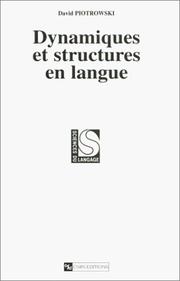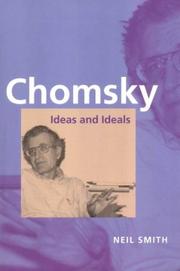| Listing 1 - 10 of 12 | << page >> |
Sort by
|
Book
ISBN: 0415083982 Year: 1992 Publisher: London Routledge
Abstract | Keywords | Export | Availability | Bookmark
 Loading...
Loading...Choose an application
- Reference Manager
- EndNote
- RefWorks (Direct export to RefWorks)
Linguistics --- Chomsky, Noam A. --- Noam Chomsky --- Noam Chomsky. --- Chomsky, Noam
Book
ISBN: 9782915312140 Year: 2008 Publisher: Sophia Antipolis Editions book-e-book
Abstract | Keywords | Export | Availability | Bookmark
 Loading...
Loading...Choose an application
- Reference Manager
- EndNote
- RefWorks (Direct export to RefWorks)
Edward Bach --- zététique --- Zêtêin --- élixirs floraux --- pharmacie --- médicine alternative --- l'auto-défense intellectuelle --- Noam Chomsky
Book
ISBN: 3946234046 3946234038 Year: 2016 Publisher: Language Science Press
Abstract | Keywords | Export | Availability | Bookmark
 Loading...
Loading...Choose an application
- Reference Manager
- EndNote
- RefWorks (Direct export to RefWorks)
Throughout much of the history of linguistics, grammaticality judgments – intuitions about the well-formedness of sentences – have constituted most of the empirical base against which theoretical hypothesis have been tested. Although such judgments often rest on subtle intuitions, there is no systematic methodology for eliciting them, and their apparent instability and unreliability have led many to conclude that they should be abandoned as a source of data.
Grammaticality (Linguistics) --- Linguistics --- Methodology --- Grammaticalness (Linguistics) --- Acceptability (Linguistics) --- Grammar, Comparative and general --- linguistic methodology --- grammaticality judgements --- intuition --- Noam Chomsky --- Parsing --- Syntax --- Methodology.

ISBN: 9781595581891 9781595583222 159558322X 1595581898 Year: 2008 Publisher: New York New press
Abstract | Keywords | Export | Availability | Bookmark
 Loading...
Loading...Choose an application
- Reference Manager
- EndNote
- RefWorks (Direct export to RefWorks)
#KVHA:American Studies --- #KVHA:Taalkunde; Verenigde Staten --- #KVHA:Noam Chomsky --- Language and languages --- Linguistics. --- World politics --- Philosophy. --- Linguistics --- Linguistic science --- Science of language --- Philosophy

ISBN: 2271054389 2271127858 9782271054388 Year: 1997 Publisher: Paris : CNRS,
Abstract | Keywords | Export | Availability | Bookmark
 Loading...
Loading...Choose an application
- Reference Manager
- EndNote
- RefWorks (Direct export to RefWorks)
Prolongeant et explicitant la pensée saussurienne, la conception dynamique des structures langagières constitue une alternative aux approches formalistes dérivées du programme chomskien. Le langage n’y est plus conçu sous le mode d’un calcul formel, mais comme un système de processus différenciateurs travaillant à modeler et à délimiter, suivant les intentions de sens des locuteurs, des régions de signification. La conception dynamique réinvestit certains fondements épistémologiques et méthodologiques de la linguistique contemporaine. Très précisément, on s’attache à montrer qu’elle procède d’un ajustement du critère de « réfutabilité », proposé par Karl Popper, à l’ordre des phénomènes langagiers. Prenant appui sur les concepts fondamentaux du structuralisme saussurien, et après une évaluation critique des modèles formels en linguistique, une architecture fonctionnelle est proposée, où les unités de langue se composent au croisement des dimensions de l’expression, du contenu et de la recevabilité. Cette architecture, qui ambitionne de fournir une analytique de la connexion signifiant-signifié, du régime de l’intégration en langue, du phénomène de recevabilité et des processus de catégorisation du contenu (par émergence d’un réseau de frontières) est développée dans le cadre d’une modélisation morphodynamique. Elle débouche sur une conception du langage comme système de production négociée et de stabilisation de valeurs sémantiques.
Linguistics --- Linguistique --- Linguistics. --- Linguistic science --- Science of language --- Language and languages --- langage --- Noam Chomsky --- Saussure --- structure du langage --- SCIENCES DU LANGAGE --- SAUSSURE (FERDINAND DE), 1857-1913 --- LINGUISTIQUE --- SAUSSURE (FERDINAND DE)

ISBN: 0714841528 9780714841526 Year: 2001 Publisher: London: Phaidon,
Abstract | Keywords | Export | Availability | Bookmark
 Loading...
Loading...Choose an application
- Reference Manager
- EndNote
- RefWorks (Direct export to RefWorks)
Vietnam War, 1961-1975 --- Social aspects --- Philip Jones Griffiths ; Foreword to the New Edition by Noam Chomsky --- fotografie --- documentaire --- documentaire fotografie --- reportagefotografie --- reportage --- oorlogsfotografie --- Magnum --- Griffiths Philip Jones --- Vietnam --- 77.071 GRIFFITHS --- Vietnam War, 1961-1975 - Pictorial works --- Vietnam War, 1961-1975 - Social aspects - Pictorial works

ISBN: 0521475708 0521475171 0511053126 0511149557 1139163892 0511009763 9780511009761 051100978X 9780511009785 9780511149559 9781139163897 9780521475174 9780521475709 Year: 1999 Publisher: Cambridge Cambridge University Press
Abstract | Keywords | Export | Availability | Bookmark
 Loading...
Loading...Choose an application
- Reference Manager
- EndNote
- RefWorks (Direct export to RefWorks)
Chomsky has had a major influence on linguistics, psychology, and philosophy. In this rigorous yet accessible account of Chomsky's work, Neil Smith analyses Chomsky's key contributions to the study of both language and the mind. He gives a detailed exposition of Chomsky's linguistic theorizing, and examines the ideas for which he is best known. Smith discusses the psychological and philosophical implications of Chomsky's work, and argues that he has fundamentally changed the way we think of ourselves. Smith examines Chomsky's political ideas and how these fit intellectually with his scholarly work. The final chapter spells out the themes - rationality, creativity and modularity - that unite the disparate strands of his vast output. Throughout, Smith explores the controversy surrounding Chomsky's work, and explains why he has been both adulated and vilified.
800 --- 800 Taalwetenschap. Taalkunde. Linguistiek --- Taalwetenschap. Taalkunde. Linguistiek --- Noam Chomsky. --- Linguistics --- Linguistic science --- Science of language --- Language and languages --- Chomsky, Noam. --- Chomsky, Noam A. --- Linguistics. --- Linguïstiek. --- Chomsky, Noam --- Chomsky, Abraham Noam --- Arts and Humanities --- Philosophy --- Chomsky (noam), 1928 --- -Linguistics --- -Chomsky (noam), 1928 --- -Linguistics.
Book
ISSN: 21982104 ISBN: 3110437244 3110446170 9783110446173 9783110437249 9783110446180 3110446189 3110444135 9783110444131 Year: 2016 Volume: 6 Publisher: Berlin, [Germany] ; Boston [Massachusetts] : De Gruyter,
Abstract | Keywords | Export | Availability | Bookmark
 Loading...
Loading...Choose an application
- Reference Manager
- EndNote
- RefWorks (Direct export to RefWorks)
This monograph deals with argument drop in the German prefield and it presents new insights into null subjects, topic drop and the interpretation of topic dropped elements. Major issues are (inter alia) the drop of structurally vs. obliquely cased arguments and the question on which basis nominative/accusative and dative/genitive can be kept apart. Furthermore, it is shown that the (im)possibility of phi-feature mismatches concerning the antecedent and gap in topic drop dialogues allows to differentiate between coreference and "real" (quantifier) binding. Aside from topic drop, (1st/2nd vs. 3rd person) null subjects are investigated across a couple of unrelated languages, also focusing on the presence of syncretisms within verbal inflectional paradigms. It is proven that 1st/2nd person null subjects in German are not an instance of antecedent-dependent topic drop but that they are licensed by discrete verbal inflectional endings. Thus, according to this property, German can be classified as a partial pro-drop language. Next to theoretical discussions and considerations this book offers a broad (empirically covered) data basis, which makes it suitable for both theoretically and empirically interested (generative) linguists.
German language --- Ashkenazic German language --- Hochdeutsch --- Judaeo-German language (German) --- Judendeutsch language --- Judeo-German language (German) --- Jüdisch-Deutsch language --- Jüdischdeutsch language --- Germanic languages --- Null subject. --- Complement. --- Null subject --- Complement --- German language - Null subject --- German language - Complement --- Generative Grammar. --- Noam Chomsky. --- Semantics. --- Syntax.
Book
ISBN: 0631153012 9780631153016 0631153020 Year: 1988 Publisher: Oxford: Blackwell,
Abstract | Keywords | Export | Availability | Bookmark
 Loading...
Loading...Choose an application
- Reference Manager
- EndNote
- RefWorks (Direct export to RefWorks)
Government-binding theory (Linguistics) --- Grammar, Comparative and general --- Language acquisition --- Acquisition of language --- Developmental linguistics --- Developmental psycholinguistics --- Language and languages --- Language development in children --- Psycholinguistics, Developmental --- Interpersonal communication in children --- Psycholinguistics --- Comparative grammar --- Grammar --- Grammar, Philosophical --- Grammar, Universal --- Philosophical grammar --- Linguistics --- Philology --- Binding theory (Linguistics) --- Government and binding (Linguistics) --- Generative grammar --- Acquisition --- Grammar, Comparative --- Chomsky, Noam. --- Chomsky, Noam A. --- Grammar, Comparative and general. --- Language acquisition. --- GB-Theorie. --- Government-binding theory (Linguistics). --- Grammaire comparée et générale. --- Grammatiktheorie. --- Langage --- Regeer- en bindtheorie. --- Théorie du liage et du gouvernement (Linguistique). --- Universalgrammatik. --- Universele grammatica (Noam Chomsky). --- Universele grammatica. --- Acquisition. --- Theories of Chomsky, Noam, 1928-. --- Chomsky, Noam, --- Théorie du liage et du gouvernement (Linguistique) --- Grammaire comparée et générale --- Chomsky, Noam --- Chomsky, Abraham Noam
Book
ISBN: 9780691143576 0691143579 9786612976377 1782685553 1400838029 1282976370 9781400838028 0691217645 9781782685555 9781282976375 Year: 2011 Publisher: Princeton, N.J. : Princeton University Press,
Abstract | Keywords | Export | Availability | Bookmark
 Loading...
Loading...Choose an application
- Reference Manager
- EndNote
- RefWorks (Direct export to RefWorks)
In this brief and incisive book, Pulitzer Prize-winning historian Garry Wills tells the story of the Confessions--what motivated Augustine to dictate it, how it asks to be read, and the many ways it has been misread in the one-and-a-half millennia since it was composed. Following Wills's biography of Augustine and his translation of the Confessions, this is an unparalleled introduction to one of the most important books in the Christian and Western traditions. Understandably fascinated by the story of Augustine's life, modern readers have largely succumbed to the temptation to read the Confessions as autobiography. But, Wills argues, this is a mistake. The book is not autobiography but rather a long prayer, suffused with the language of Scripture and addressed to God, not man. Augustine tells the story of his life not for its own significance but in order to discern how, as a drama of sin and salvation leading to God, it fits into sacred history. "We have to read Augustine as we do Dante," Wills writes, "alert to rich layer upon layer of Scriptural and theological symbolism." Wills also addresses the long afterlife of the book, from controversy in its own time and relative neglect during the Middle Ages to a renewed prominence beginning in the fourteenth century and persisting to today, when the Confessions has become an object of interest not just for Christians but also historians, philosophers, psychiatrists, and literary critics. With unmatched clarity and skill, Wills strips away the centuries of misunderstanding that have accumulated around Augustine's spiritual classic.
Augustine of Hippo --- Christian saints --- Biography --- History and criticism. --- Augustine, --- Augustine. --- Augustine, --Saint, Bishop of Hippo. --Confessiones. --- Christian saints - Algeria - Hippo (Extinct city) - Biography - History and criticism. --- Christian saints - Algeria - Hippo (Extinct city) - History and criticism. --- Christian saints --Algeria --Hippo (Extinct city) --Biography --History and criticism. --- Religion --- Philosophy & Religion --- Christianity --- Saints --- Canonization --- RELIGION / Christianity / History. --- Academic skepticism. --- Adolf von Harnack. --- Ageless Wisdom. --- Anguish. --- Asceticism. --- Astrology. --- Augustine of Hippo. --- Autobiography. --- Being and Time. --- Bible. --- Bildungsroman. --- Book of Confessions. --- Book. --- Celibacy. --- Christian. --- Christianity. --- Church Fathers. --- Confessions (Augustine). --- Consciousness. --- Consecration. --- Creation myth. --- Criticism. --- Dasein. --- Donatism. --- Ecclesiology. --- Edmund Husserl. --- Examination of conscience. --- Existentialism. --- Explanation. --- Facsimile. --- False prophet. --- Forgetting. --- Gervasius and Protasius. --- Gifford Lectures. --- God. --- Goethe's Faust. --- Hannah Arendt. --- Hedonism. --- Henri Bergson. --- Hierius. --- His Family. --- Historicity. --- Historiography. --- Jacques Derrida. --- Jean-François Lyotard. --- Jean-Jacques Rousseau. --- John Colet. --- Late Antiquity. --- Lecture. --- Ludwig Wittgenstein. --- Manichaeism. --- Marian devotions. --- Martin Heidegger. --- Narrative. --- Neoplatonism. --- Noam Chomsky. --- On Memory. --- On the Trinity. --- Oral tradition. --- Parchment. --- Paulinus of Nola. --- Pelagianism. --- Pelagius. --- Perversion. --- Phenomenon. --- Philosopher. --- Philosophy. --- Plotinus. --- Postmodernism. --- Predestination. --- Psalms. --- Psychobiography. --- Rebecca West. --- Rebuke. --- Religion. --- Religious text. --- Renunciation. --- Rhetoric. --- Romanticism. --- Rundown (Scientology). --- Saint Monica. --- Scholasticism. --- Septuagint. --- Sermon. --- Shorthand. --- Simplician. --- Specific gravity. --- Superstition. --- Søren Kierkegaard. --- Tanakh. --- The Christian Community. --- The First Man. --- Theft. --- Theology. --- Thomas Aquinas. --- Thought. --- Thérèse of Lisieux. --- Treatise. --- Valentinian (play). --- Writing.
| Listing 1 - 10 of 12 | << page >> |
Sort by
|

 Search
Search Feedback
Feedback About UniCat
About UniCat  Help
Help News
News